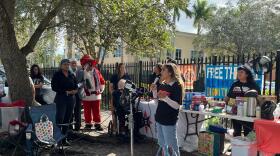
Jimena Romero
News and Public Affairs ProducerJimena Romero is WLRN’s News and Public Affairs Producer. Besides producing The South Florida Roundup, she is also a general assignment reporter.
She graduated from the University of Florida in Spring 2024 with a bachelor’s degree in Journalism.
During her time as a Gator, Romero served as a multimedia journalist as well as producer for The Point Podcast and anchor of All Things Considered for WUFT News, North Central Florida’s NPR-affiliate. Her performance in these roles earned her the Ralph L. Lowenstein Broadcast News Award.
Jimena’s love for telling stories through sound ignited during her early college years at Miami Dade Honors College where she served as podcast director for Urbana Literary & Arts Magazine.
Jimena can be reached at jromero@wlrnnews.org.
-
Hundreds of thousands of Haitians under Temporary Protected Status woke up relieved after a federal judge blocked the Trump administration from ending the immigration status. Haitian TPS holders are still in limbo.
-
The Trump administration wants to deport hundreds of thousands of Haitians back to Haiti — where a million and a half people are already refugees from gang violence. Legal experts spoke on WLRN’s South Florida Roundup about the resources and options for the community being affected by this decision.
-
Local Christian, Muslim and Jewish religious leaders — along with members of their respective congregations — come together routinely outside of U.S. Immigration and Customs Enforcement facilities in the region to call attention to abuses in the immigration system.
-
With temperatures dropping in parts of South Florida this week starting Tuesday night, local officials activated their cold weather emergency plans. The National Weather Service said a cold front moving through the region Tuesday will bring in cooler air overnight.
-
"Such a pause would show a decent regard for the humanity of these families," they said. "Now is not the time to be callous toward the suffering caused by immigration enforcement."
-
The board of trustees for Miami Dade College is holding a new vote on the contentious transfer of downtown Miami land for President Donald Trump’s presidential library, following a lawsuit to block the move. This time Miami residents could have a chance to weigh in.
-
A new book, Raising America: A Visual Celebration of Educators, highlights the personal narratives of 80 teachers, 12 of which are from Miami through portraits. The authors, Chantel Jiroch, Careshia Moore and some of the educators featured in the book will appear at the 2025 Miami Book Fair.
-
Motorists can now move between Hollywood-Fort Lauderdale International Airport and area beaches thanks to a newly opened shortcut route.
-
Miami-Dade County Public Schools (M-DCPS) has officially opened the application window for its nationally recognized Magnet and Voluntary Prekindergarten (VPK) programs for the 2026-2027 school year, the district announced today.
-
South Florida’s affordability crisis is deepening again, the United Way ALICE report finds.
-
While two South Florida cities take part in hearings this week seeking to preserve their rainbow crosswalks, the removal of two art crosswalks in Coral Gables — by the late renowned Venezuelan artist Carlos Cruz-Diez — happened almost unnoticed. In fact, many residents had been upset by the cost of the installation in the first place.
-
Members of two advocacy groups say arts and culture organizations and events pump $2.1 billion into the local economy each year and support 32,000 jobs.












